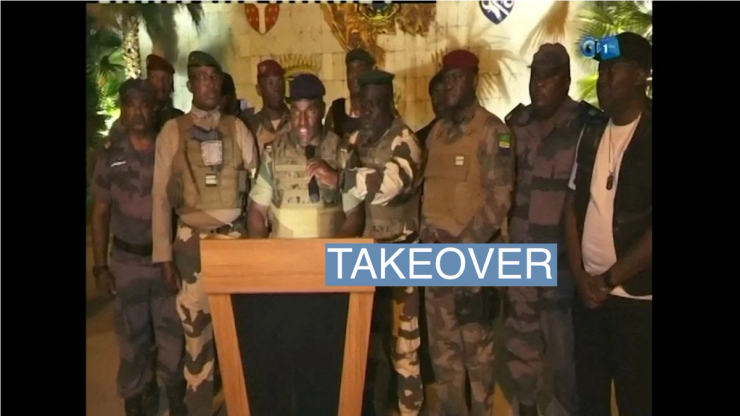The News
Military leaders in Gabon said they had seized power and placed President Ali Bongo under house arrest on Wednesday, days after a widely-disputed election declared Bongo the winner.
In this article:
Know More
In a video shared on social media, the deposed president pleaded for help while under house arrest. “I want to send a message to all of the friends we have all over the world, to tell them to make noise,” Bongo said.
Gen. Brice Oligui Nguema, who headed the coup, initially denied reports that he has been selected to replace Bongo. “I am not declaring myself yet, I am not considering anything at the moment. It is a debate we will have with all the generals,” he said the in an interview with French outlet Le Monde.
He added that Bongo is now “retired and enjoys all his rights... He is a normal Gabonese, like everyone else.”
The leaders of the coup later announced that Nguema was named transitional president and that a nightly curfew would remain in place, AFP reported.
Bongo’s electoral win on Saturday had been criticized by the opposition. Journalists were prevented from covering the election, and international observers were not allowed to monitor the proceedings.
On social media, videos circulated showing people celebrating in the streets of the capital, Libreville, at the news of the military’s takeover. Bongo has held power in Gabon since the death of his father, Omar Bongo, in 2009.
Gunfire was heard in Libreville earlier Wednesday.
Alexis’s view
The coup seems to be a reaction to the dynastic rule of the Bongo family whose 56-year reign over the oil-rich nation hasn’t translated into wealth for most citizens, which explains the videos of celebrations circulating on social media.
The opposition cried foul even before Bongo was announced as the winner of the election, but the government blocked internet access in the wake of Saturday’s vote and provisionally banned three French broadcasters over their election coverage, which effectively stripped dissenters of a voice. Bongo’s previous election victories were disputed as fraudulent by opponents and a change to voting papers just weeks before this year’s election prompted criticism.
The implications of the coup in the central African country are likely to be felt beyond its borders. It’s the world’s largest producer of high-grade manganese ore, one of the most widely used metals in the world. It makes up around 14% of global supplies, according to analysts. The OPEC member is also one of Africa’s largest oil exporters producing around 200,000 barrels a day. And in recent years the country — one of the world’s most forested nations — has been at the vanguard of using climate finance to develop new sources of revenue and diversify away from a reliance on crude oil sales. It has developed eco-friendly policies, such as the sale of green bonds in exchange for protecting its woodland and a $500 million “blue bond” to safeguard marine life. Investors have already taken a dim view of the coup.
Step Back
This is not the first time the military has tried to overthrow Gabon’s government. In 2019, putschists took over a local radio station while Bongo was in the hospital following a stroke. That coup was unsuccessful, and the leader was subsequently arrested, Pulse Nigeria reported.

